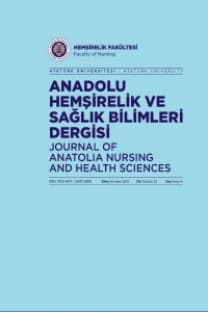PSYCHOSOCIAL ADJUSTMENT IN HEART FAILURE PATIENTS WITH CARDIOVERTER DEFIBRILLATOR IMPLANTATION
___
- Adaylar, M. The Attitudes, Adaptation, Perception and Self-care Orientations to Illnesses of Individuals Who Have a Chronic Disease. Ph.D Thesis, İstanbul University, Institute of Health Sciences. İstanbul, 1995.
- Akın S, Durna Z. Kalp yetersizliği hastalarının psikososyal uyumu. Cumhuriyet Üniversitesi Hemşirelik Yüksekokulu Dergisi 2006; 10(2):1-8.
- Beery AT, Baas S, Henthorn C. Self-reported adjustment to implanted cardiac devices. J Cardiovasc Nurs 2007; 22(6):516-24.
- Bilge KA, Özben B, Demircan S, Cinar M, Yilmaz E, Adalet K. Depression and anxiety status of patients with ımplantable cardioverter defibrillator and precipitating factors. Pacing Clin Electrophysiol 2006; 29(6):619-26.
- Burke LJ, Hallas NC, Clark-Carter CD, White D, Connely D. The psychosocial ımpact of the implantable cardioverter defibrillator: a meta-analytic review. Health Psychol 2003; 8(Pt 2):165-78.
- Buxton AE, Leek KL, Fisher JD, Josephson ME, Prystowsky EN, Hafley G. A randomize study of the prevention of sudden death in patients with coronary artery disease. N Engl J Med 1999; 341(25):1882-90.
- Carroll LD, Hamilton AG. Quality of life implanted cardioverter defibrillator recipients: the impact of a device shock. Heart Lung 2005; 34(3):169-78.
- Carroll DL, Hamilton GA. Long term effect of implanted cardioverter defibrillators on health status, quality of life and psychological state. Am J Crit Care 2008; 17(3):222-30.
- Chair SY, Lee CK, Choi KC, Sears SF. Quality of life outcomes in chinese patients with ımplantable cardioverter defibrillators. Pacing Clin Electrophysiol 2011; 34(7):858-67.
- Conti BJ, Sears FS. Understanding and managing the psychological impact of the ICD. Cardiac Electrophysiol Rev 2001; 5(1):128-32.
- Derogatis LR. The Psychosocial Adjustment to Illness Scale (PAIS). J Psychosom Res 1986;30(1):77-91.
- Dougherty CM, Hunziker J. Predictors of implantable cardioverter defibrillator shocks during the first year. J Cardiovasc Nurs 2009; 24(1):21-30.
- Dunbar SB, Dougherty CM, Sears SF, Carroll DL, Goldstein NE, Mark DB, et al. Educational and psychological interventions to improve outcomes for recipients of implantable cardioverter defibrillators and their families a scientific statement from the American Heart Association. Circulation 2012; 126(17):2146-72.
- Dunbar SB, Langberg JJ, Reilly CM, Viswanathan B, McCarty F, Culler SD, et al. Effect of a psychoeducational intervention on depression, anxiety, and health resource use in implantable cardioverter defibrillator patients. Pacing Clin Electrophysiol 2009; 32(10):1259-71.
- Dunbar SB. Psychosocial issues of patients with implantable cardioverter defibrillators. Am J Crit Care 2005; 14(4):294-303.
- Kohn CS, Petrucci RJ, Baessler C, Soto DM, Movsowitz, C. The effect of psychological intervention on patients' long-term adjustment to the ICD: a prospective study. Pacing Clin Electrophysiol 2000; 23(4):450-56.
- Lindenfeld J, Feldman AM, Saxon L, Boehmer J, Carson P, Ghali JK, et al. Effects of cardiac resynchronization therapy with or without a defibrillator on survival and hospitalizations in patients with New York Heart Association Class IV in heart failure. Circulation 2007; 115(2):204-12.
- Mauro AMP. Exploring uncertainty and psychosocial adjustment after cardioverter defibrillator implantation. JCardiovasc Nurs 2008; 23(6):527-35.
- Mauro AMP. Long-term follow up study of uncertainty and psychosocial adjustment among implantable cardioverter defibrillator recipients. Int J Nurs Stud 2010; 47(6):1080-88.
- Moss AJ, Hall WJ, Cannom DS, Daubert JP, Higgins SL, Klein H, et al. Improved survival with an implanted defibrillator in patients with coronary disease at high risk for ventricular arrhytmia. N Engl J Med 1996; 335(26):1157-67.
- Sears FS, Conti BJ. Quality of life and psychological functioning of ICD patients. Heart 2002; 87(5):488- 93.
- Sears SF, Shea JB, Conti JB. How to respond to an implantable cardioverter defibrillator shock. Circulation 2005; 111(23):380-82
- Sears SF, Matchett M, Conti JB. Effective management of ICD patient psychosocial issues and patient critical events. J Cardiovasc Electrophysiol 2009; 20(11): 1297-304.
- Smeulders E, van Haastregt J, DijkmanDomanska B, van Hoef E,van Eijk J, Kempen G. Nurse and peer-led self-management programme for patients with an implantable cardioverter defibrillator; a feasibility study. BMC Nursing 2007; 6(6):1-8.
- Sola LC, Bostwick MJ. Implantable cardioverter defibrillators, induced anxiety and quality of life. Mayo Clin Proc 2005; 80(2):232-37.
- Thomas SA, Friedmann E, Gottlieb SS, Liu F, Patricia GM, Chapa DW, et al. Changes in psychosocial distress in outpatients with heart failure with implantable cardioverter defibrillators. Heart Lung 2009; 38(2):109-20.
- Thylén I, Dekker RL, Jaarsma T, Strömberg A, Moser DK. Characteristics associated with anxiety, depressive symptoms, and quality-of-life in a large cohort of implantable cardioverter defibrillator recipients. J Psychosom Res 2014; 77(2):122-27.
- White MM. Psychosocial impact of the ımplantable cardioverter defibrillator: nursing implications. J Cardiovasc Nurs 2002; 16(3):53-61.
- Zayac S, Finch N. Recipients' of implanted cardioverter defibrillators actual and perceived adaptation: a review of the literature. J Am Acad Nurse Pract 2009; 21(10):549-56.
- ISSN: 1309-5471
- Yayın Aralığı: 4
- Yayıncı: Atatürk Üniversitesi Hemşirelik Fakültesi
YENİDOĞAN GÖBEK BAKIMINDA KLORHEKSİDİN, İYOT VE ALKOLÜN KARŞILAŞTIRILMASI
Refika GENÇ KOYUCU, Yıldız TOSUN, Fadime ÇINAR
PSYCHOSOCIAL ADJUSTMENT IN HEART FAILURE PATIENTS WITH CARDIOVERTER DEFIBRILLATOR IMPLANTATION
Arnel BÖKE KILIÇLI, Leyla ÖZDEMİR
NÖROŞİRÜRJİ HASTALARININ AMELİYAT ÖNCESİ ANKSİYETE DÜZEYLERİ
Sevban ARSLAN, Seçil TAYLAN, Sevgi DENİZ
Emine Şireci, Elanur Yılmaz Karabulutlu
SAĞLIK EYLEM SÜRECİ YAKLAŞIMI MODELİ
ÇOCUK KLİNİKLERİNDE ÇALIŞAN HEMŞİRELERİN TIBBİ HATA YAPMA EĞİLİMLERİNİN İNCELENMESİ
OPINIONS OF HEALTH CARE PROFESSIONALS REGARDING NURSING PROFESSION
Sultan AYAZ ALKAYA, Şengül YAMAN
Hatice ÖNER ALTIOK, Mehtap KIZILKAYA
